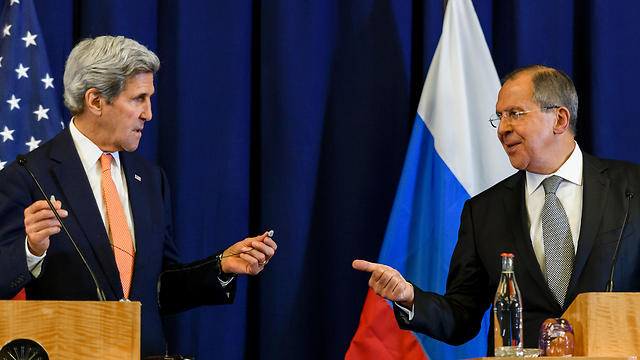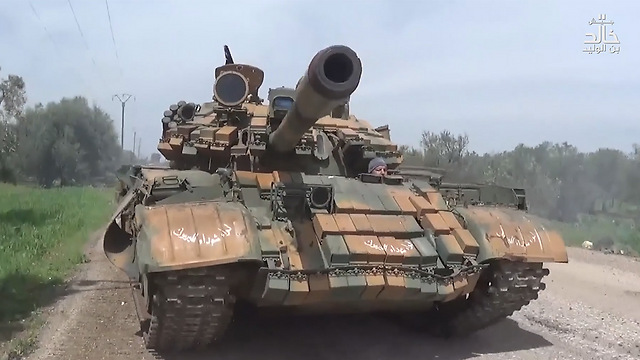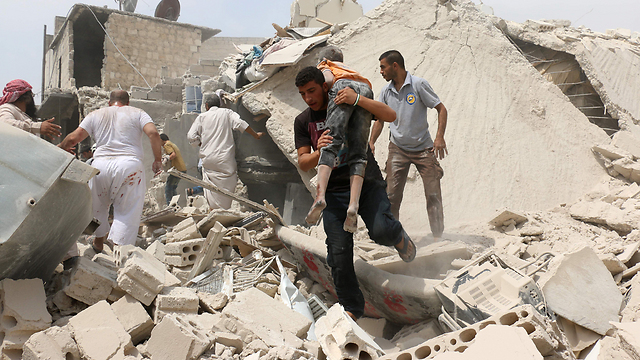Analysis: The opposing interests of the many external and internal elements involved in the fighting in Syria make it impossible to reach any political settlement that could create a new reality in the divided country and stop the bloodshed.
The Syria ceasefire agreement, which was signed by the United States and Russia and took effect on Monday, may only be implemented randomly, in the form of local and temporary truces in certain areas. There is no chance, however, for a full ceasefire – in other words, an end to the serious bloodshed.
The war in Syria, which has been going on for more than five years, has already claimed the lives of hundreds of thousands of people—including women and children—and has left millions wounded and turned more than half of the country’s citizens into refugees; some in their own country, some in neighboring countries, and some flowing into Europe.

This war between the Alawite regime and its rivals includes external elements with opposing interests: The Shiite camp, led by Iran with the involvement of Hezbollah, supports Syrian President Bashar al-Assad and receives backing and military aid on the ground from Russia.
The Sunnis are divided into dozens of militias, few of which are jihadist (like ISIS, Jabhat Fateh al-Sham and others), that receive support from the Gulf states, led by Saudi Arabia, and recently from the US as well. The Kurds in northern Syria are fighting ISIS, but oppose the regime as well. They are supported today by the US and other Western states, but are attacked by Turkey, which sees a Kurdish autonomy in northern Syria as a threat to its interests.
The opposing interests between the external elements involved in the fighting in Syria make it impossible for the war to be decided or for any political settlement to create a new reality in the divided country and stop the bloodshed.

The US is interested in seeing in Syria a moderate Sunni regime leaning towards the West, but has so far hesitated to put any significant effort into that. Russia sees the importance of the continued existence of an Alawite regime (with or without Assad) for fear that the alternative would be a complete breakup and radicalization, and would lead to Moscow losing its foothold on the ground. Turkey, for its part, would like to see a Sunni regime in Damascus, but is busy fighting the Kurds. That’s the reason why Recep Tayyip Erdogan’s regime supported ISIS for such a long time and allowed jihadists from around the world to flock to Syria so that they would join the war and strike the Kurds.
This chaos increases the chance, which is high as it is, that the ceasefire will not be implemented, all the more so when as far as the Sunnis—who make up more than 70 percent of Syria’s population—and their bitter rivals in the Alawite community are concerned, they have an open account to settle.
The ceasefire agreement, therefore, mainly reflects an external involvement attempt rather than clear interests by the rival elements to end the war. Moreover, the pretension of different elements to reunite Syria is unrealistic. Syria is already divided into demographically-based cantons, and I believe it will remain that way for many years to come.

The Syrian Army, which was once considered one of the strongest armies in the Middle East, is worn out and damaged. The longer the fighting continues—and it will continue—its situation could get even worse. Assad knows this. He also knows that without the help he has been receiving from Russia, Iran and Hezbollah, his chances for survival will drop significantly. The forces following his orders will not be able to preserve the current situation without the Russian and Iranian umbrella and the weapons supplied by Moscow and Tehran.
Assad and his supporters know it is a battle of life and death, and this situation will continue even if Assad himself decides to leave Syria and seek refuge in another country. The term “the Assad regime,” therefore, no longer refers to a state’s regime but to an ethnic group controlling certain areas across what used to be Syria.
For Israel, the ceasefire agreement changes nothing. It’s important to continue acting responsibly and use discretion with the non-involvement policy in the internal war in Syria while protecting our interests, which are outlined as red lines: not allowing our sovereignty to be violated (as we experienced this week) and to respond firmly when it happens; not allowing the transfer of advanced weapons to our enemies; and not allowing the transfer of chemical substances and weapons to our enemies (which has yet to happen).
This policy has proved itself so far and has deterred all the elements involved in the war: The Syrian regime, the Iranian Revolutionary Guards, Hezbollah and ISIS. It must be continued.
As reported by Ynetnews
